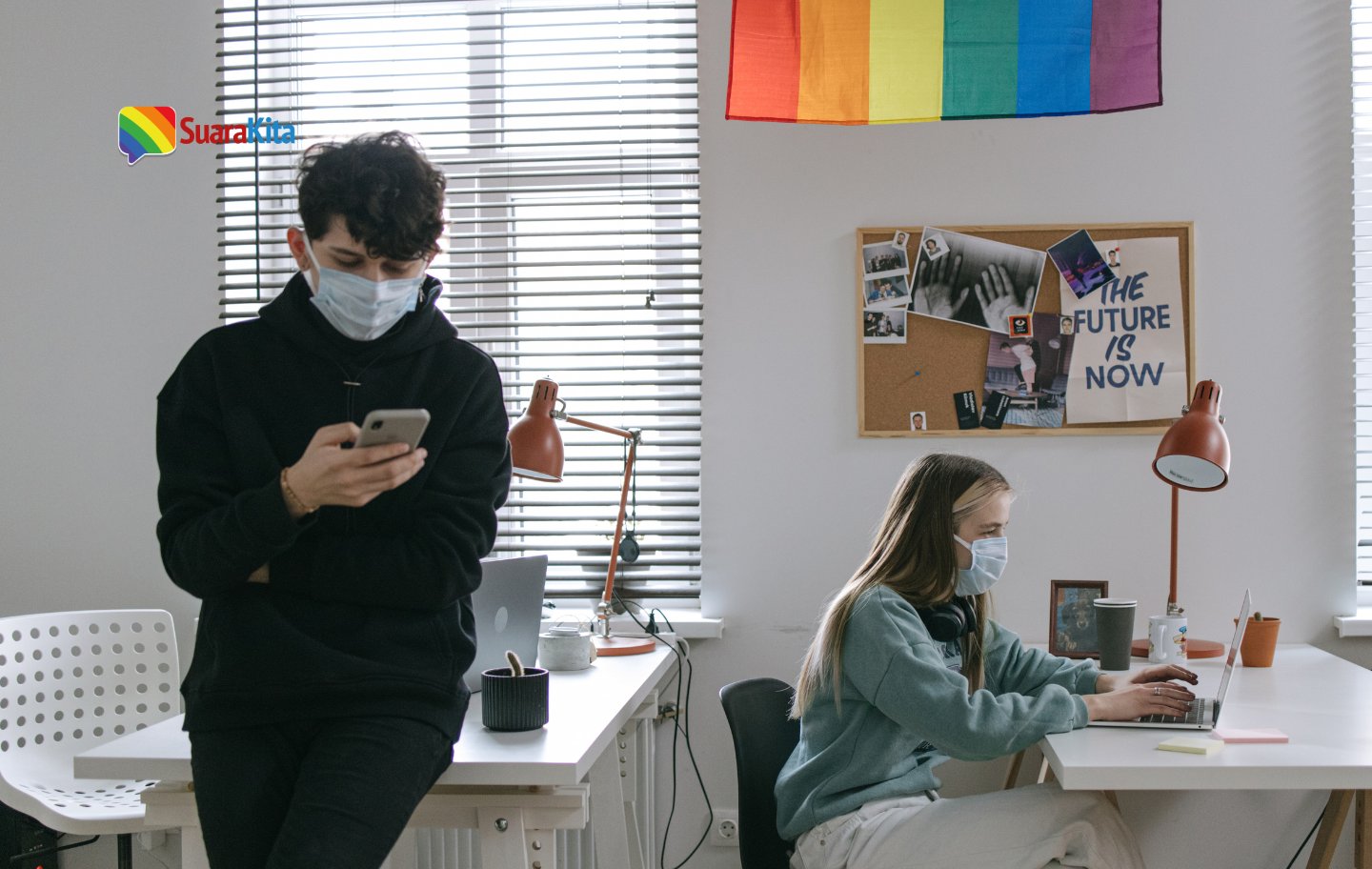Presiden Liberia yang juga pemenang Nobel , Ellen Johnson Sirleaf (73) telah membela hukum yang mengkriminalisasikan tindakan Homoseksual
Dalam wawancara bersama dengan mantan perdana menteri Inggris Tony Blair, begitu terlihat ada ketidak nyamanan dari kedua belah pihak membicarakan tentang homoseksualitas, Ibu Sirleaf mengatakan kepada surat kabar The Guardian: “Kami punya nilai-nilai tradisional tertentu dalam masyarakat, dan kita ingin melestarikan melestarikan nila-nilai tersebut.”
Di Liberia “sodomi sesama jenis” merupakan pelanggaran hukum dengan ancaman pidana satu tahun penjara.
Blair, dalam kunjungannya ke Liberia sebagai pendiri Afrika Governance Initiative (AGI), adalah sebuah badan amal yang bertujuan untuk memperkuat pemerintah Afrika, menolak untuk mengomentari pernyataan Ms Sirleaf.
Ketika ditanya “apakah pemerintahan yang baik adalah pemerintah yang menjunjung tinggi hak asasi manusia?”. Ibu Sirleaf tidak memberikan jawaban. “Yang saya lakukan saat ini adalah memilih dan memilah masalah yang menjadi prioritas untuk membangun negara saya lebih baik lagi. dan bagi kami. Saat ini yang terpenting adalah memprioritaskan masalah sarana dan prasarana, seperti penyediaan listrik, membangun jalan dan juga masalah ketenagakerjaan”, ungkap Ibu Sirleaf.
Lebih dari 10 tahun menjabat sebagai perdana menteri Inggris, Blair cukup gigih mengkumandangkan isu kesetaraan, termasuk kesetaraan terhadap LGBT. Blair juga telah mendorong pemerintah untuk disah kan-nya undang-undang kemitraan sipil, mengkampanyekan anti diskriminasi di militer, juga mengusulkan agar pemerintah menurunkan batasan usia dewasa bagi LGBT menjadi 16 tahun.
Blair menolak untuk memberikan rekomendasi reformasi hak-hak gay. Dia mengeluarkan tawa yang tertahan setelah, Ibu Sirleaf memotong pembicaraan yang mengarah pada pembahasan homoseksualitas, karena memang pertemuan yang dilakukan tidak mengagendakan untuk membahas tentang homoseksualitas tapi lebih pada kapasitas Blair sebagai sebuah pimpinan lembaga dan juga salah satu pemberi hibah dana untuk kegiatan di Liberia.
Perdebatan hak-hak lgbt membahana di Liberia setelah sekretaris Negara Amerika Serikat Hillary Clinton, Desember 2011 menyatakan bahwa anggaran bantuan luar negeri Amerika yang akan diberikan kepada Negara-negara mitra, mencakup promosi perlindungan hak-hak lgbt.
Pernyataan yang dikemukakan Hilary menjadi perhatian bagi Liberia, karena sampai saat ini Liberia menjadi salah satu Negara di Dunia yang memberlakukan hukum Kriminalitas bagi LGBT. Sejak pernyataan tersebut dilontarkan, berbagai media Liberia ramai menuliskan berbagai artikel yang menyatakan bahwa Homoseksulitas adalah “keji” dan menodai nilai-nilai tradisonal.
Corinne Dufka, seorang peneliti senior untuk Human Rights Watch di barat Afrika. Menyatakan bahwa “ selama enam bulan terakhir, kasus kekerasan berdasarkan orientasi seksual dan identitas gender mengalami kenaikan yang cukup signifikan, intoleransi berupa penyerangan menjadi wajah yang mengerikan bagi LGBT Liberia”.
Salah satu narasumber yang tidak disebutkan identitasnya mengatakan bahwa alasan utama ia dan sekelompok komunitasnya melakukan tindak kekerasan berupa penyerangan adalah karena mereka telah melakukan identifikasi sasaranya yaitu LGBT. Dan baru-baru ini sepuluh perempuan ditangkap oleh kepolisian setempat (kamerun), karena dituduh lesbian.
Di 37 negara Afrika, Homoseksualitas merupakan tindakan illegal dan di kriminalkan melalu ketetapan yang disetujui oleh pemimpinya. Tidak hanya dikriminalkan namun ada yang lebih berat dari itu yaitu hukuman mati, atau hukuman 14 tahun penjara bagi orang-orang LGBT.
Ellen Johnson Sirleaf, dianugerahi hadiah Nobel perdamaian pada 2011, karena beliau merupakan salah satu perempuan yang giat mengkampanyekan hak-hak perempuan di Negaranya. Selain itu Ibu Sirleaf merupakan presiden perempuan pertama yang memimpin Afrika selama dua kali pemilihan berturut-turut.
Menurut Gongloe Tiawan S, seorang pengacara ternama di Liberia mengatakan bahwa “Liberia belum siap untuk perdebatan tentang hak-hak LGBT, Liberia perlu pendidikan publik tentang masalah ini. Masyarakat masih enggan mengangkat isu homosekualitas ke permukaan”.
Gongloe juga mengatakan pada pertemuan puncak Uni Afrika awal tahun ini, Sekjen PBB, Ban Ki-moon mendesak para pemimpin Afrika untuk menghormati hak-hak LGBT dan berhenti memperlakukan LGBT sebagai warga negara kelas dua dan sebagai pelaku kriminal. Setelah 14 tahun perang saudara yang berakhir pada tahun 2003, Liberia masih salah satu negara termiskin di dunia.
Sumber berita dan Video : www.guardian.co.uk
Sumber Foto : www.mirror.co.ukThe Nobel peace prize winner and president of Liberia, Ellen Johnson Sirleaf, has defended a law that criminalises homosexual acts, saying: “We like ourselves just the way we are.”
In a joint interview with Tony Blair, who was left looking visibly uncomfortable by her remarks, Sirleaf told the Guardian: “We’ve got certain traditional values in our society that we would like to preserve.”
Liberian legislation classes “voluntary sodomy” as a misdemeanour punishable by up to one year in prison, but two new bills have been proposed that would target homosexuality with much tougher sentences.
Blair, on a visit to Liberia in his capacity as the founder of the AfricaGovernance Initiative (AGI), a charity that aims to strengthen African governments, refused to comment on Sirleaf’s remarks.
When asked whether good governance and human rights went hand in hand, the British former prime minister said: “I’m not giving you an answer on it.”
“One of the advantages of doing what I do now is I can choose the issues I get into and the issues I don’t. For us, the priorities are around power, roads, jobs delivery,” he said.
Over his 10 years as prime minister, Blair became a champion for the legal equality of gay people, pushing through laws on civil partnerships, lifting a ban on gay people in the armed forces and lowering the age of consent for gay people to 16.
A Catholic convert, he called on the pope to rethink his “entrenched” views and offer equal rights to gay people. But gay rights, he said, were not something he was prepared to get involved in as an adviser to African leaders.
With Sirleaf sitting to his left, Blair refused to give any advice on gay rights reforms. He let out a stifled chuckle after Sirleaf interrupted him to make it clear that Blair and his staff were only allowed to do what she said they could. “AGI Liberia has specific terms of reference … that’s all we require of them,” she said, crossing her arms and leaning back.
There have been no recent convictions under the sodomy law, according to the latest US state department human rights report. However, anti-gay activists have promoted two new bills which would take the legislation much further. One would amend the penal code to make a person guilty of a second-degree felony if he or she “seduces, encourages or promotes another person of the same gender to engage in sexual activities” or “purposefully engages in acts that arouse or tend to arouse another person of the same gender to have sexual intercourse”, carrying a prison sentence of up to five years.
The second bill – drafted by the ex-wife of the former president Charles Taylor – would make gay marriage a crime punishable by up to 10 years in jail. Jewel Howard Taylor told the Guardian: “[Homosexuality] is a criminal offence. It is un-African.” She went on to say: “It is a problem in our society. We consider deviant sexual behaviour criminal behaviour.
“We are just trying to strengthen our local laws. This is not an attempt to bash homosexuals.”
The gay rights debate erupted in Liberia after the US secretary of state, Hillary Clinton, announced in December that America’s foreign aid budget would promote the protection of gay rights, prompting speculation that funds would be tied to rights records.
The announcement brought unprecedented attention to homosexuality in a country where until recently gay people and lesbians lived in secret, but generally not in fear for their lives. Since Clinton’s remarks, Liberian newspapers have published numerous articles and editorials describing homosexuality as “desecrating”, “abusive” and an “abomination”.
“Over the last six months, we’ve seen a worrying increase in anti-gay rhetoric, intolerance and indeed attacks on individuals fighting for the rights of Liberians in same-sex relationships,” said Corinne Dufka, a senior researcher for Human Rights Watch in west Africa.
In the past month alone there have been at least six homophobic attacks in the capital, Monrovia.
One 21-year-old gay man, who recently left Monrovia to move to the countryside after some of his friends were threatened, said he now lived in fear of mob violence, a common occurrence on the streets of Monrovia. “You and your brother walking down the street, they may actually jump on you and beat you, kill you, and when they say: ‘Oh they are gay, that’s the reason we killed them,’ nothing will come of it,” he said.
Homosexuality is already illegal in 37 African countries. In Uganda, a bill proposing custodial sentences for homosexuality is still being considered, although it no longer contains the provision for the death penalty. Ten women were recently arrested in Cameroon accused of being lesbians, while in Nigeria, homosexual activities are punishable by up to 14 years in prison.
Sirleaf was awarded the Nobel peace prize last year for her work in campaigning for women’s rights. The 73-year-old became Africa’s first female president in 2006 and was elected for a second term last year. “If she tried to decriminalise the [current anti-gay] law it would be political suicide,” said Tiawan S Gongloe, the country’s former solicitor general. Without a majority government, Sirleaf desperately needs the support of other MPs to tackle other issues such as corruption, exploitation of the country’s natural resources and mass youth unemployment, he said.
After 14 years of civil war that ended in 2003, Liberia is still one of the poorest countries in the world.
Gongloe also said the country was still not ready for a debate on gay rights. “Liberians need public education on the issue. Our society is not at that point yet to have a civil conversation on the issue,” he said.
At an African Union summit earlier this year Ban Ki-moon urged African leaders to respect gay rights and to stop treating gay people as second-class citizens and criminals.
When pushed on the UN secretary general’s comments, with Sirleaf at his side, Blair responded: “I’m not saying these issues aren’t important, but the president has given her position and this is not one for me.”
News source and Video : www.guardian.co.uk
Picture source : www.mirror.co.uk



